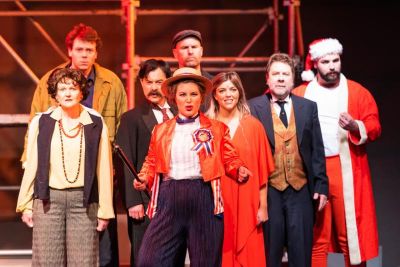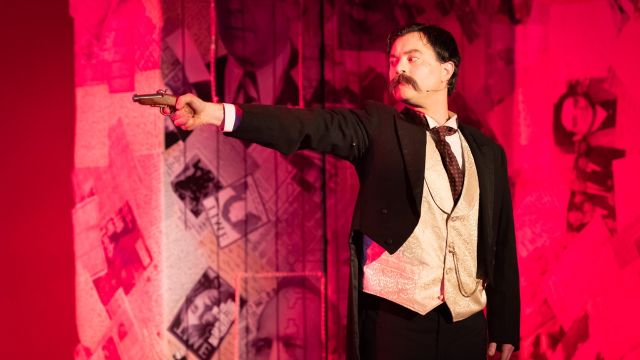Assassins
Assassins by Stephen Sondheim and John Weidman is a delightful and provocative piece of American musical political satire. Its subject matter is the respective ‘assassins’, or would be ‘assassins’, of certain Presidents of the United States of America. This ranges from John Wilkes Booth to Lee Harvey Oswald, with others who were inspired by and followed Booth and Oswald in their egoistic drive to achieve some form of fame and importance, to be remembered, and to have a place in history.
The reality is, however, that very few people, especially in Australia, know anything about the respective assassinations, or attempted assassinations of American Presidents, including President Lincoln and President Kennedy. Assassins brings these assassins back to life in a rather perverse way.
Assassins, however, is not just a fascinating ‘revisionist’ history lesson, it is a terrific piece of subversive satire that takes aim at two of the most fundamental tenets and aspects of American democracy and society – the constitutional right to ‘the pursuit of happiness’ as stated in the American Declaration of Independence, and the American (and worldwide) obsession with fame and ‘celebrity’; being a ‘star’.
The darkness of this subject matter is somewhat alleviated by the revue nature of the show. This is not so much a conventional book-musical but a series of revue type sketches straight out of the world of American vaudeville. We meet the respective ‘assassins’ in the opening number, set in a shooting booth at a fairground, with the number “Everybody’s Got the Right to Be Happy”; and if that means killing a President then that’s ok, one has a constitutional right to do so.

Complementing this twisted perversion of ‘the pursuit of happiness’ Sondheim and Weidman deliberately and purposefully place the respective variations on this theme in a ‘show biz’ context. For the most part each ‘assassin’ is driven not so much by a political agenda but a desire to achieve some form of American ‘celebrity’ status. In this case, it is a completely egotistic need to be noticed, to be considered important, and ‘to be remembered’, that drives these assassins. It is insane, psychopathic, very contemporary and relevant, and all too human.
Overall, this is a terrific production of Assassins by the Hills Musical Society. The standard of singing and musicianship throughout the entire show is truly excellent. This is a notoriously difficult and complex musical theatre score by Stephen Sondheim. That every number in this production is superbly sung deserves the highest praise and congratulations to all involved.
Despite the excellent singing, however, there is overall a profound and relatively disappointing lack of imaginative theatrical style and charm in this production. There are glimpses of this heightened theatrical world in the respective musical numbers, but not in the scenes and monologues that link the songs. These scenes (and scene changes) seem too disjointed and disconnected from the songs. Too often the scenes felt unshaped to me, and descended into a generalised form of one-level ‘naturalism’ with unnecessary pausing that robbed the scenes and the characters of any ‘style’, wit, humour and power.
Bronwen James (Sarah Jane Moore) and Robin Schmelzkopf (Charles Guiteau), however, were two actors who seemed to have successfully conquered and solved the unique truth and reality of their characters in the heightened theatrical style of this world of Assassins. They were simply terrific in everything they did and raised the standard of the production whenever they were on-stage.

Despite the above reservations, however, this production of Assassins is well worth seeing. Making these respective psychopaths into comic characters in the heightened theatrical world of Assassins perversely humanises them. They charm us with their wit and maniacal passions. We can identify with their sense of isolation and need for human contact and connection.
In this case, however, they are a band that best connects and supports each other. This reaches a climax in the final confrontation scene between John Wilkes Booth and Lee Harvey Oswald. This truly extraordinary scene and the argument it presents, is, alone, one reason to see this production.
Booth is joined by the other ‘assassins’ in compelling Oswald to take his place in history and subsequently join the past as well as the future in this murderous act that defines him and a generation.
It is truly chilling when he does.
Tony Knight
Photographer: Mark Anolak
Subscribe to our E-Newsletter, buy our latest print edition or find a Performing Arts book at Book Nook.

